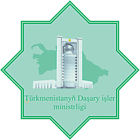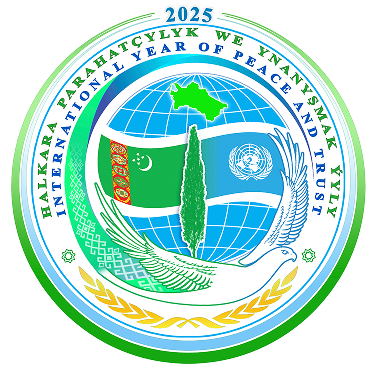of Peace and Trust»




On November 29, 2017, the 28th session of the Energy Charter Conference under the theme "Mobilizing Investments for Sustainable Energy of the Future and Diversifying Transport Routes" continued its work at the Oguzkent Hotel.
The Ministerial part of the 28th session of the Energy Charter Conference served as a platform for decision-makers at the highest level and leaders of energy enterprises to engage in policy dialogue on sustainable energy investments, reliable transit and diversification of supply routes and energy sources within the International Energy Community Charter.
During the session, the Chairman of the Energy Charter Conference, Deputy Chairman of the Cabinet of Ministers of Turkmenistan M.Babayev, Vice Prime Minister, Minister of Foreign Affairs of Georgia M.Janelidze, OSCE Secretary General Thomas Greminger, Secretary General of the International Energy Charter U.Rusnak made their presentations.
Chairman of the Energy Charter Conference, Deputy Chairman of the Cabinet of Ministers of Turkmenistan M. Babayev summing up the results of Turkmenistan's chairmanship in the Energy Charter, listed the measures taken by Turkmenistan to ensure comprehensive and indivisible energy security. He said that the geography of membership in the Energy Charter is also expanding, that at the present time the appeals of several other countries are being considered. Turkmenistan considers diversification of the transport infrastructure as one of the main tasks in the sphere of energy security. "The implementation of this strategic direction assumes a comprehensive development of energy cooperation not only between the energy supplier countries, their transit countries and consumers, but also by interested parties and international organizations, in particular the UN and the Energy Charter," M.Babayev said.
Secretary General of the International Energy Charter Urban Rusnak said that in many countries energy policy reforms are being carried out. He believes that the Energy Charter Treaty should be modernized, that there is a great potential for attracting investments in the development of energy.
Speaking at the session, OSCE Secretary General Thomas Greminger praised Turkmenistan's chairmanship in the Energy Charter, and said that this country plays a significant role in maintaining stability in the Central Asian region. Speaking about the fact that the OSCE has been dealing with energy security issues for several years, Greminger said that geopolitical competition requires political cooperation in matters of energy security.
Speaking at the conference, Deputy Prime Minister and Foreign Minister of Georgia Mikheil Janelidze said that joining the Southern Gas Corridor would allow Turkmenistan to transport its gas to Turkey and Europe. M.Janelidze also touched upon the TAPI project - a gas pipeline being built between Turkmenistan, Afghanistan, Pakistan and India. In the context of energy transfer from the region to Europe, the politician stressed the particular importance of such projects as the South Caucasus Gas Pipeline, the Transanatolian Gas Pipeline, the Trans Adriatic Gas Pipeline and also "White Stream".
Expressing gratitude to the Government of Turkmenistan and personally to the President of Turkmenistan Gurbanguly Berdimuhamedov for the support provided during the 28th session of the Energy Charter Conference and appreciating the efforts to strengthen the role of the International Energy Charter during the Turkmenistan Chairmanship, the participants in the 28th session of the Energy Charter Conference adopted Ashgabat Declaration of the Energy Charter as a strategic medium-term document until the next review to be undertaken in 2019.
Then a press conference was held, during which representatives of Turkmenistan, Japan, Romania and the Secretary General of the International Energy Charter made statements.
ASHGABAT ENERGY CHARTER DECLARATION
We, the Members of the Energy Charter Conference assembled in Ashgabat, Turkmenistan, on 29 November 2017 for the 28th Meeting of the Energy Charter Conference with attendance of high-level representatives from 52 countries of different regions of the world and 10 international organizations,
Welcoming that the Federal Republic of Nigeria, the Republic of Kenya, Burkina Faso, the Republic of Mali, the United Arab Emirates, Panama, and The Republic of Gambia signed the International Energy Charter in 2017 and thus became Observers to the Conference,
Reiterating commitment to the Energy Charter Treaty and the principles of the 2015 International Energy Charter,
Acknowledging the important role of the Energy Charter Treaty for the promotion of energy security through energy trade, transit, investment promotion and protection, and energy efficiency,
Recalling the Tokyo declaration of the 27th Meeting of the Energy Charter Conference adopted in 2016, and final documents of preceding Meetings of the Energy Charter Conference,
Recalling also the resolutions of the United Nations General Assembly on «Reliable and Stable Transit of Energy and its Role in Ensuring Sustainable Development and International Cooperation» of 2008 and 2013, and welcoming Ashgabat International Energy Charter Forum entitled «Towards a Multilateral Framework Agreement on Transit of Energy Resources)) which recognized importance of transit in global energy issues,
Recognizing the essential role of energy for improving the quality of life,
Emphasizing that the Energy Charter Process must reflect new developments and challenges in international energy markets by promoting the core values of the Energy Charter,
Emphasizing that the modernization of the Energy Charter Process is key to ensuring that it fulfills its potential to strengthen long-term co-operation in the energy field and contribute to enhancing energy security,
Recognizing that investments in the energy sector, effectively utilizing different types of energy resources and technologies with consequent changes in investment flows and patterns, are required to achieve countries’ commitments to the United Nations Sustainable Development Goals and the Paris Agreement in line with their goals and principles, including the principle of equity and common but differentiated responsibilities and respective capabilities, in the light of different national circumstances,
Emphasizing the importance of fostering innovation in developing energy resources, technologies, technological applications and business models that enable accelerated delivery of global Sustainable Development Goals,
Stressing that energy sector investments are best served by a stable, predictable and nondiscriminatory regulatory framework while recognizing that Governments have the right to regulate to achieve legitimate policy objectives,
Underlining that disputes are best prevented and, if they occur, resolved efficiently and, where possible, amicably,
Taking into account the work conducted by and underlining the need to increase synergy with regional and global institutions,
Recognizing the Energy Charter Secretariat’s effort to implement Energy Charter Treaty’s core tasks,
Expressing gratitude to the Government of Turkmenistan and personally to the President of Turkmenistan, Gurbanguly Berdimuhamedov, for the support provided for convening of the 28th Meeting of the Energy Charter Conference and commending the efforts in enhancing the role of the International Energy Charter throughout the year of the Chairmanship of Turkmenistan.
Adopt:
The Ashgabat Energy Charter Declaration, as a strategic mid-term document towards the next review to be undertaken in 2019, in accordance with Article 34(7) of the Energy Charter Treaty.
Facilitating investment, preventing and managing investment related disputes
We recognize that as countries modernize and transition their energy systems according to their national circumstances, needs and priorities, aligned with international commitments to mitigate climate change and achieve Sustainable Development Goals, the Energy Charter Process contributes to enabling the large flow of investment needed and improving business environment.
We acknowledge that promoting quality infrastructure investments is essential for bridging the existing energy infrastructure gap in the world.
We welcome the preparatory work of the Energy Charter Secretariat and acknowledge its continued efforts to develop a new publicly available flagship publication, the Energy Investment Risk Assessment, which will assist interested countries in minimizing investment-related regulatory risks, thereby enabling an optimization of investment flows.
We underline the importance of industry’s involvement in the Energy Charter Process and welcome the recent activities of the Energy Charter Industry Advisory Panel.
We acknowledge continued efforts by the Energy Charter Secretariat on dispute prevention and the possibility of amicable dispute resolution, mediation and legal training.
Continuing to broaden and deepen membership of the Energy Charter Treaty
We encourage the State signatories of the European Energy Charter or the International Energy Charter to accede to the Energy Charter Treaty and stand ready to assist respective countries in this process.
We acknowledge the work of the Energy Charter Secretariat in facilitating the accession process that countries choosing to accede to the Treaty are required to undertake.
Improving energy security through strengthened international cooperation to guarantee energy transit and facilitate trade
We recognize the role of the Energy Charter Process in enhancing regional and international energy cooperation, facilitating interconnectivity and promoting open and competitive energy markets in order to ensure universal access to sustainable energy sources, except for circumstances generating concerns for international security and national security of the involved states, thus reinforcing energy security.
We acknowledge that natural gas can play an important and effective role in moving towards a low greenhouse-gas (GHG) emission energy future and we believe that a well-functioning, transparent and competitive global gas market including LNG trading hubs should be further developed.
We welcome the work on energy transit under the Chairmanship of Turkmenistan and will continue our work on transit issues with a view to supporting diversified energy sources and supply routes and secure reliable and sustainable energy transportation.
Modernizing the Energy Charter Process
We continue efforts to make further progress in the modernization of the Energy Charter Process as appropriate in order to meet our common objectives and with a focus on the Energy Charter Treaty’s core business.
Contracting Parties to the Energy Charter Treaty will seek to launch a dialogue with the aim of exploring the potential update and modernization of the Energy Charter Treaty.
Promoting regional energy cooperation on the basis of the principles of the International Energy Charter and Energy Charter Treaty
We encourage the work of the Energy Charter Secretariat in promoting and integrating regional energy markets for long-term energy sustainability and building energy resilience, and note the relevance of these regional activities to facilitation and promotion of strategic infrastructure projects aimed on delivering secure, sustainable and competitive energy to customers.
Done at Ashgabat on 29 November 2017

